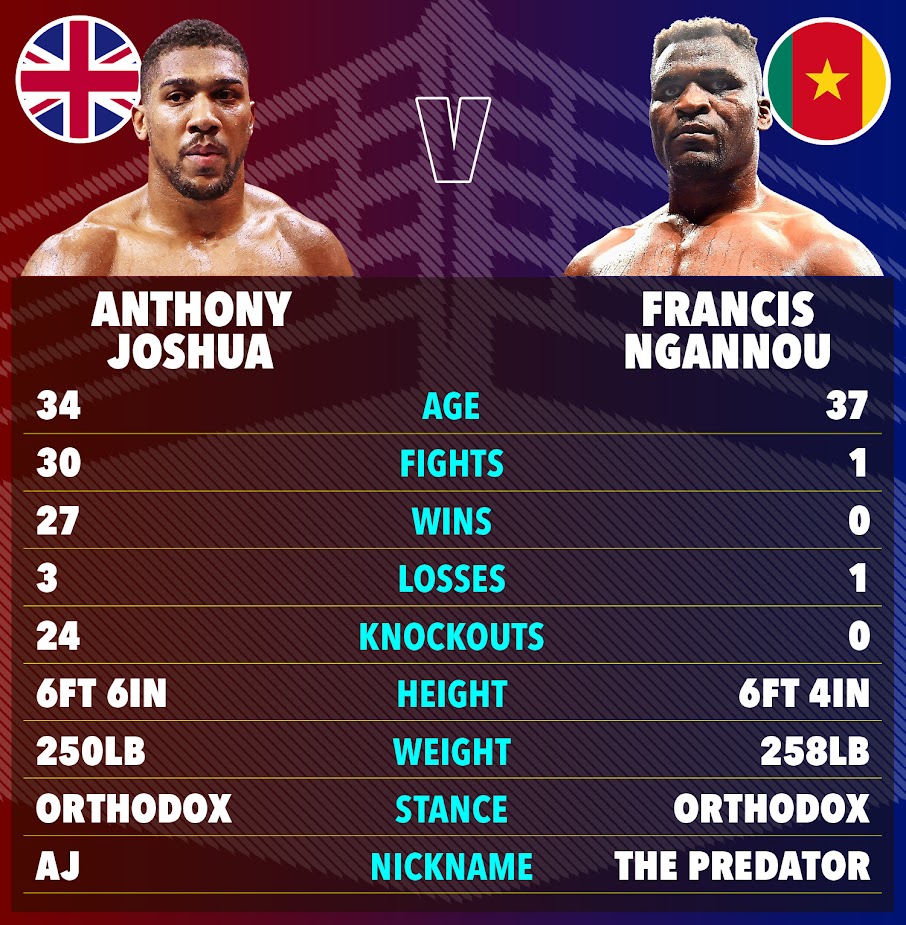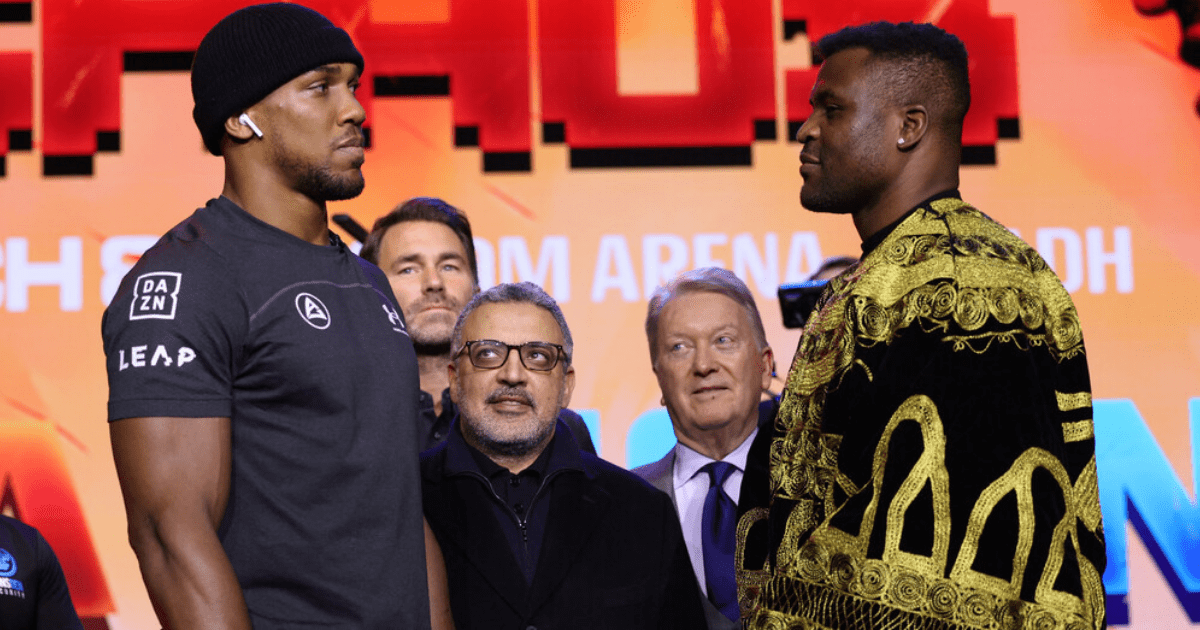British Boxing Legend Ricky Hatton Expresses Concerns
Anthony Joshua has received a warning from former UFC champion Francis Ngannou, who will make his second appearance in the boxing ring on March 8 in Saudi Arabia. Joshua, who saw his super-fight with Deontay Wilder cancelled, has been backed as a favorite by British boxing legend Ricky Hatton. However, Hatton refused to rule out the possibility of Ngannou knocking out Joshua due to the power he possesses.
Joshua's Explosiveness and Power
Ricky Hatton acknowledged Joshua's boxing skills and explosiveness, highlighting his Olympic gold medal and two-time heavyweight champion titles. However, Hatton also noted that Joshua can be hurt, knocked down, and stopped. With Ngannou's size and punching power, Hatton believes there is a chance that he could knock out Joshua. Nevertheless, he emphasized that Joshua is a well-rounded and accomplished boxer.
The Right Time for Joshua
Hatton believes that this is the right time for Joshua to showcase his skills and impress, especially after Tyson Fury struggled against Ngannou. Hatton stated that a strong performance from Joshua would work in his favor when negotiating a potential fight with Fury.
Opportunity to One-Up Fury
By fighting Ngannou right after Fury, Joshua has the chance to outperform his old rival and make a statement. Hatton believes that Joshua's confidence is sky high, and an impressive performance against Ngannou would be a massive advantage in their favor.

Source: The Sun
Frequently Asked Questions
Is it possible to learn boxing professionally for anyone?
Even though boxing may be accessible to all, not everyone is cut out to compete professionally. Boxing is a sport that requires a special combination of physical strength, mental toughness, talent and dedication. Prospective boxers should also be willing accept the inherent risk of the sport. A thorough examination by a trainer is a good way to determine whether or not someone has potential for a boxing career.
What are the risks of professional boxing?
As with any contact sport there are inherent risks in professional boxing. These include acute injuries such as cuts, bruises, broken bones, and head trauma, as well as potential chronic conditions from repeated impacts, such as concussion syndromes or neurological disorders. Boxing regulations, safety gear, and proper training can help reduce risks. However, they cannot be completely eliminated. It is important to understand and accept these risks before you decide to box professionally.
What equipment is essential for someone starting in professional boxing?
Essential equipment for anyone who wants to start in professional boxing includes boxing glove, hand wraps and mouthguard (for sparring). Also included are proper footwear. For technical training, a heavy bag, a speed bag, a double-end bag and other aids are essential. It is essential to use equipment that provides protection and durability. Otherwise, you may increase your risk of injury.
What role do managers and promoters have in the professional career of a boxer?
Promoters and managers play a crucial role in the professional career of a boxer. Managers are in charge of guiding a boxer’s professional career, negotiating contracts and managing the boxer’s business affairs. They are also responsible for selecting the appropriate fights and protecting the boxer’s interest. Promoters are more focused on marketing, event organization and attracting sponsorship attention. They also focus on enhancing a boxer’s profile.
What are some of the most important components in a boxer’s training regime?
The training regimen of a boxer is usually composed of several important components. This includes technical skill development and tactical drills. It also includes strength and condition, sparring sessions, and mental prep. Technique-focused workouts improve punch accuracy and defensive maneuvers, while tactical drills develop fight strategies. Sparring and conditioning exercises provide practical combat experience. Mental training focuses on building confidence, focus, and resilience.
What are the requirements to train for professional boxing?
Before beginning to train for professional boxing one must be committed to physical fitness and discipline. They also need to have an eagerness to learn. Initial training includes learning the fundamentals of boxing, including footwork, stance and defensive tactics. You should join a reputable gym with trainers who are experienced and understand the nuances in professional boxing competition. Novice boxers typically undergo a rigorous regimen of conditioning, technique drills, and sparring to develop their skills before considering competition.
How important are physical conditioning and training for professional boxers?
Professional boxing requires a high level of physical conditioning. The sport requires high levels of speed, strength, endurance, agility, and endurance. Professional boxers must engage in a tailored fitness program that includes aerobic and anaerobic exercises, strength and resistance training, and flexibility workouts. A boxer cannot train efficiently and perform well in the ring without superior physical fitness.
Statistics
- Research shows that a boxer’s reaction time is typically under 0.25 seconds, honed through repetitive drills and sparring.
- Around 60% of professional boxers supplement their income with other activities or jobs, due to variability in fight earnings.
- Professional boxers typically train 4 to 6 hours per day, 5 to 6 days a week, depending on their fight schedule.
- Cardiovascular fitness is critical, with a focus on high intensity interval training, comprising up to 40% of a boxer’s conditioning program.
- Reports suggest that successful professional boxers can earn upwards of 50 times more than the median purse for entry-level professionals per fight.
- As per recent surveys, only about 17% of professional boxers reach a title shot opportunity in their careers.
- The average age for boxers to turn professional is between 18 to 25 years, though many continue to compete well into their 30s and beyond.
External Links
ibhof.com
proboxing-fans.com
expertboxing.com
precisionstriking.com
boxingscene.com
sweetsciencefitness.com
boxingnews24.com
How To
How to manage recovery after intense boxing training
Performance and progress are dependent on a quick recovery from intense boxing sessions. Use a cooldown routine to reduce muscle soreness after workouts. Include stretching and low intensity cardio. Prioritize nutrition after your workout. A mix of proteins and carbohydrates will help you recover. Rehydrate yourself after exercise. For recovery, you need to get 7-9 hours of sleep each night. Regular foam rolling and massage can help reduce stiffness by supporting muscle recovery.

